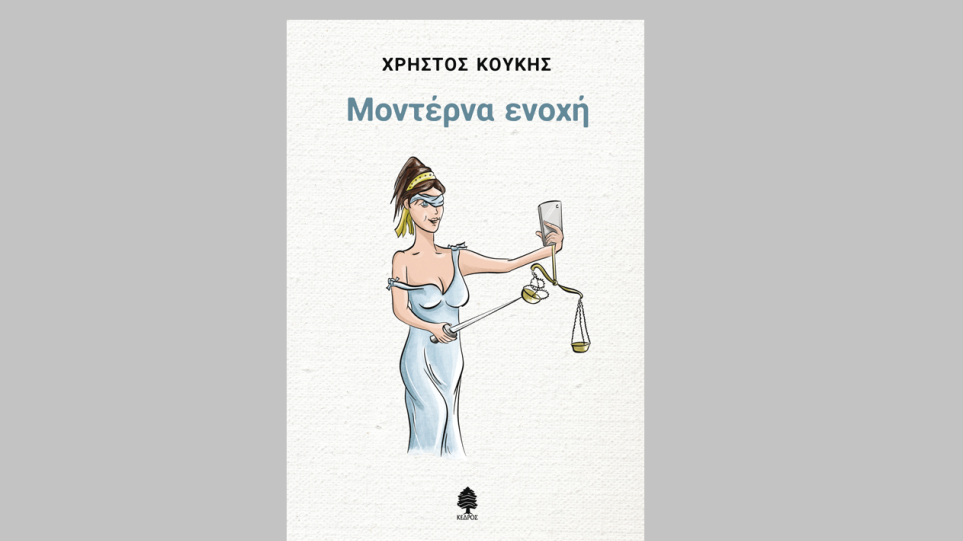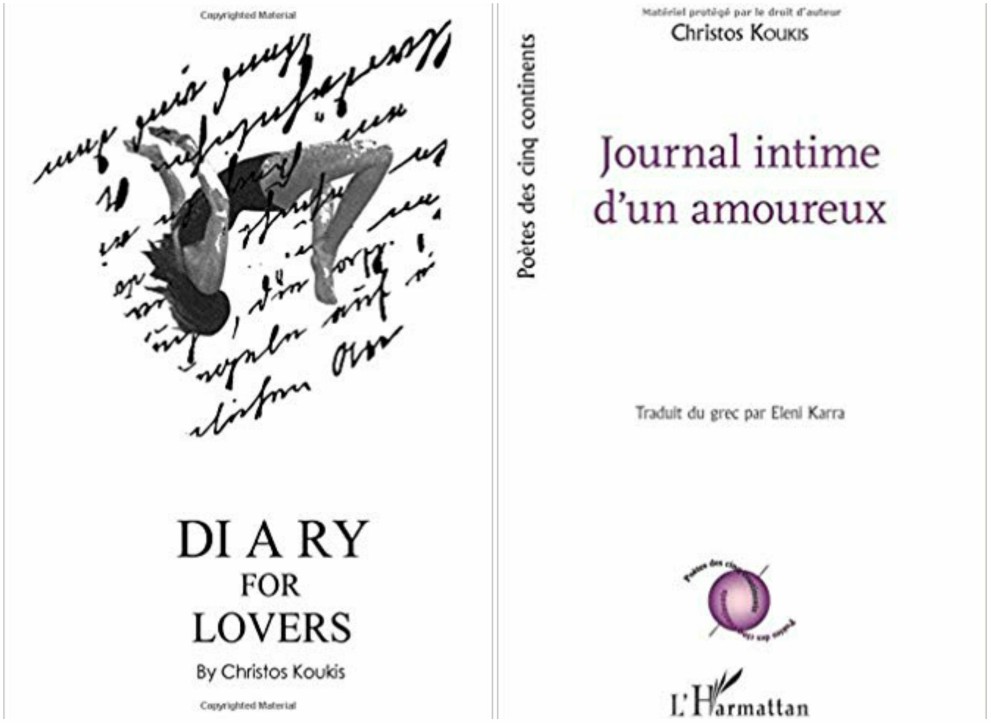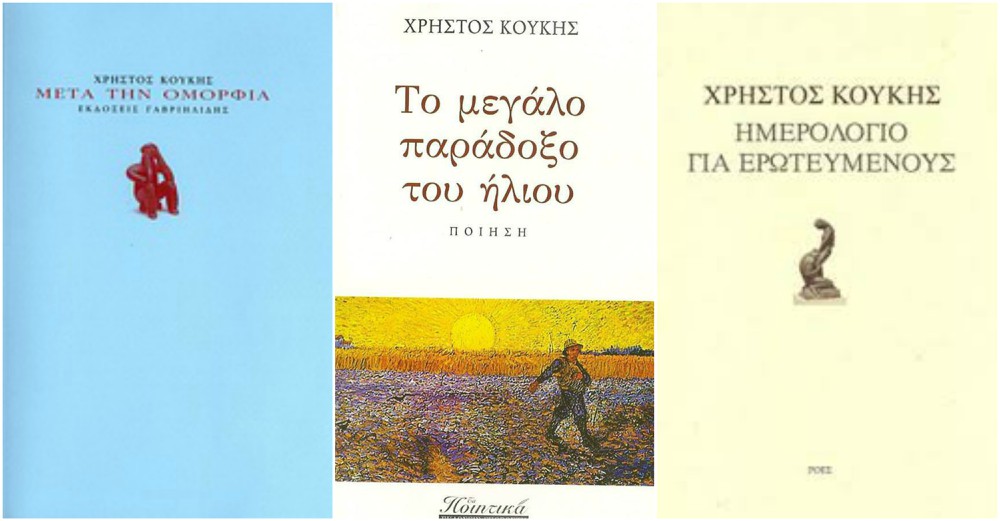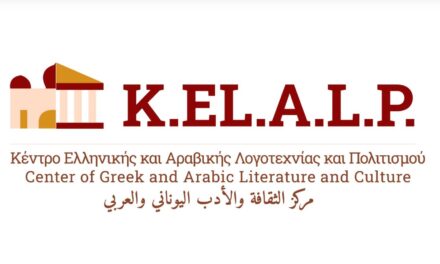Christos Koukis was born in 1979 and he is a poet and a writer. He has published poetry books in Greece, France, India and Serbia and poems of his have been translated in eight (8) languages. He has participated in poetry anthologies in Greece and other countries and in several international poetry festivals around the world. He has worked in poetry and culture magazines and has written lyrics for songs. Recently he collaborated in an international project for Documenta 14 Athens. He lives and works in Athens.
Christos Koukis spoke to Reading Greece* about his latest book Μοντέρνα Ενοχή [Modern Guilt], which was written during the latest financial crisis, aiming to “express a kind of different opinion about the country and generally the world and its direction”. He comments on the main themes his poetry touches upon such as “the will to make lyrical pictures, to defend people’s pain, to speak loud about human rights and to write about love” and notes that “my driving force is the goal to learn every land of myself, to explore the perspective of my writing and to build a warmer world”. He concludes that “poetry is political by default” and that it is “in darker and more crucial times that poetry can give us immediate answers and guide us to a better tomorrow”.
Your latest poetry collection Moντέρνα Ενοχή [Modern Guilt] was recently published by Kedros Publishers. Tell us a few things about the book.
It’s a new book written during the latest financial crisis in Greece, during an era full of pressure for change, for answers. After four years since my last book, I had so many things to protest for, so many words to testify and a new approach to old ideas. I wanted to express a kind of different opinion about my country and generally the world and its direction. We live in such an interesting historical period and we should bear the responsibility of our fate, of our life. Kedros Publications gave me the opportunity to be a free poet.

From Μετά την ομορφιά [After the beauty] in 2010 to Μοντέρνα ενοχή in 2018 what changed and what remained the same in your poetry? Which are the main themes your poetry touches upon?
The past 8 years the things that remain the same in my poetry are my will to make lyrical pictures, to defend people’s pain, to speak loud about human rights and to write about love. I can’t claim that the main themes of my poetry are much different from the ones we have the past three thousand years like love, war, pain etc. But I can say that during these years the way I write poetry, the forms I use, the poets I read, the state I am and the position I feel I have in the society have been transformed and evolved. The depth of the words and the different angles of sight I use in my poetry are much heavier.
Ημερολόγιο για Ερωτευμένους [Diary for lovers] was translated both in English and French. What has been the appeal of the book among foreign readers?
The French translation of the book was released by the biggest French publishing house ‘Editions L’ Harmattan’ and was well received. It left a very positive impression to the French-speaking public outside of France and I received a lot of nice messages. There will soon be its official presentation in Paris. The English translation of the book is yet to be published, since my goal is to have it published in USA. Nevertheless, the reception is warm, foremost with regards to the overall concept of the book, that is the way in which lovers perform poetry in everyday life.

“The primary need that poetry wants to fulfill and defend is resistance to the triviality and wear of everyday life”. What led you to poetry and what continues to be your driving force?
My agony for more light led me to poetry. My agony for more resistance against darkness. Every time I sink into triviality, poetry offers a hand, becomes the ‘deus ex machine’ of my soul. Poetry reminds me all the time where I want to go, where my dreams live and the human way to fight for them. Poetry shows me where to look to, if I want to see. My driving force is the goal to learn every land of myself, to explore the perspective of my writing and to build a warmer world.
What is the relationship of poetry to the world it inhabits? What can it mean for poetry to be political, or apolitical, in times of social and economic crisis?
Poetry is political by default, no matter the times, no matter if we have crisis or not. Poetry is connected with our world since the birth of language and the need to express our mind and soul with poetic words is fundamental. We are weak before the universe and poetry heals this loneliness. The only thing that changes through centuries is the impact of poetry in our lives. We feel that in darker and more crucial times, poetry can give us immediate answers and guide us to a better tomorrow. Poetry has the power to explain this heavy load in us. That’s why the importance of poetry is more valuable in times when everything seems bright and definitely not urgent.

In recent years the interest of foreign readers in Greek poetry has been rekindled, with an increasing number of Greek anthologies being translated in English. What is it that makes a national poetry appealing to a foreign audience? And, in turn, to what extent do Greek poets incorporate foreign influences in their work?
First of all, it’s very encouraging that Greek poets, especially the young ones, are translated in foreign anthologies. It should make us happy and willing to work harder towards this direction in the future. The enormous and unprecedented crisis that we live the past decade, put our country on the spotlight of the international community for both positive and negative causes. Among the most positive ones is the new generation of poets, who decided to write about this era. Foreign audience discovered interesting voices, new kind of expressions and people who raise a voice.
But the world nowadays is globalized and so is poetry. Thankfully, we can easily find translations of a huge number of poets from around the world and different times. We read poetry from Latin America, from Asia and we can easily connect directly with living poets from any place of the world. It’s logical and likely to happen that Greek poets are influenced by foreign poetry and incorporate forms and patterns. But I think it’s too early to know which is the extent of it and if this extent will work on our benefit or it will tamper our national element. Beyond doubt, we need this cultural exchange but we must not forget that our tradition is a sustainable and hospitable well.
*Interview by Athina Rossoglou
TAGS: LITERATURE & BOOKS | READING GREECE













